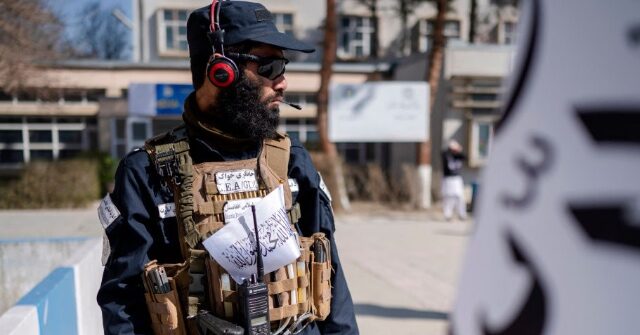A top diplomat representing the Taliban terror organization ruling Afghanistan demanded representation for the group at the United Nations this week, insisting the Taliban’s participation in the global organization was a “necessity and a right.”
Suhail Shaheen, who has represented the Taliban in negotiations with the U.N. in the past and now runs the group’s embassy in Qatar, noted that the Taliban has been the uncontested government of Afghanistan for nearly four years and insisted that the group deserves some say in the operations of the United Nations.
“The presence of a representative from the Islamic Emirate of Afghanistan at the United Nations is both a necessity and a right of the Islamic Emirate’s government,” Shaheen told the Afghan Tolo News outlet in remarks published on Sunday. “Through such a representative, solutions to various issues can be pursued.”
The Taliban formally refers to itself as the “Islamic Emirate of Afghanistan” to distinguish itself from the former, legitimate government of the country, the Islamic Republic of Afghanistan. It has not been officially recognized as the legitimate government of the country by any state actor since it toppled the Afghan government on August 15, 2021, when its members stormed Kabul, the nation’s capital, and sent then-President Ashraf Ghani fleeing in a helicopter.
While no country officially identifies the Taliban as a government body, multiple nations have accepted Taliban rule as a form of “interim” government to allow for trade and other negotiations with the terrorists. The rogue regimes of Iran and China were among the first to adopt the “interim” moniker and rapidly pursue joint business operations, particularly in the fields of mining and resource development. Internationally, the Taliban has struggled to obtain control of every Afghan embassy and consulate around the world, prying them out of the control of Ghani-era officials one by one. As of September, the Taliban boasted that it controls 39 Afghan missions around the world, all of which are allegedly “fully operating.”
“Calling for the international community and the United Nations to assess Afghanistan based on its current realities, Mawlawi Muttaqi urged for a more pragmatic approach to diplomatic relations with the Islamic Emirate,” the Taliban-run Bakhtar News Agency reported at the time, citing a local official.
The Taliban ruled the country for years in the 1990s before the United States invasion in response to the September 11, 2001, terrorist attacks. Extensive evidence indicates that its members still maintain a relationship with Al Qaeda, the jihadist group responsible for the attacks. The head of Al Qaeda, Ayman Al-Zawahiri, was killed by a U.S. airstrike in Kabul in 2022 and reportedly lived openly in the nation’s capital, offered lodging by “Interior Minister” Sirajuddin Haqqani.
The ongoing relationship with Al Qaeda is one of several reasons the United Nations has yet to offer the Taliban regime representation in its fora, despite welcoming similarly bloodthirsty regimes such as those of North Korea, Iran, or China. Currently, the representatives of Afghanistan at the United Nations are diplomats representing the no-longer-existing Ghani government who have lobbied the U.N. for years not to replace them with the Taliban’s chosen envoys.
The U.N. has attempted to balance the dueling demands by engaging with the Taliban through its special Afghanistan office, the U.N. Assistance Mission in Afghanistan (UNAMA), and inviting Taliban representatives to some of its events. While keeping the Ghani government’s diplomats, the U.N. Security Council approved of state actors working in “close consultation with all relevant Afghan political actors and stakeholders,” without exempting the Taliban, in March 2022.
In one particularly shocking episode, the U.N. invited Taliban terrorists to COP29, the 29th edition of its annual climate alarmism talks. There, Taliban environment official Matiul Haq Khalis asserted that the jihadists “must participate in such conferences in the future” because Afghanistan is vulnerable to climate change.
“We participated in the conference this year so that we could raise the voice of the nation about the issues we are facing, what the needs of the people are, we must share these things with the world,” he asserted.
UNAMA is currently in the process of what it has deemed a “mosaic” approach towards restructuring its relationship with the Taliban, nearly four years after it installed itself as the ruling entity of Afghanistan. According to the country’s Amu TV, the plan has outraged representatives of the former Afghanistan at the U.N. and human rights activists as its proposes “lifting sanctions on the Taliban, granting the group access to frozen Afghan assets, and potentially transferring control of Afghan diplomatic missions — including its seat at the United Nations — to the Taliban as part of broader political engagement.”
“Any framework aimed at granting concessions or normalizing relations with the Taliban,” the current head of Afghanistan’s U.N. mission in New York Nasir Ahmad Faiq warned, “especially those drafted without transparency, enforcement mechanisms, or meaningful change in Afghanistan’s political and social situation—will not be acceptable to the Afghan people.”
It is unclear what the Afghan people, imprisoned under an extreme fundamentalist sharia system, can do to express their disapproval, if Faiq’s assessment is correct. In addition to its years of battle experience during the American occupation, the Taliban inherited a trove of advanced American weaponry, defense technology, and fuel when President Joe Biden extended the 20-year Afghan War and then abruptly withdrew U.S. troops, abandoning the former Bagram air base. Support from China and Iran has also fortified the Taliban’s position. No reports indicate that a viable opposition movement to the Taliban exists in the country.
Follow Frances Martel on Facebook and Twitter.
Read the full article here


